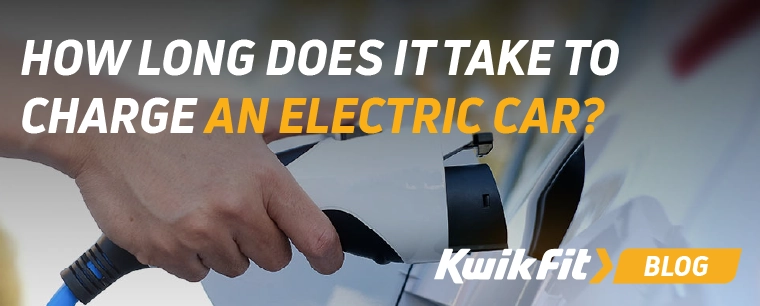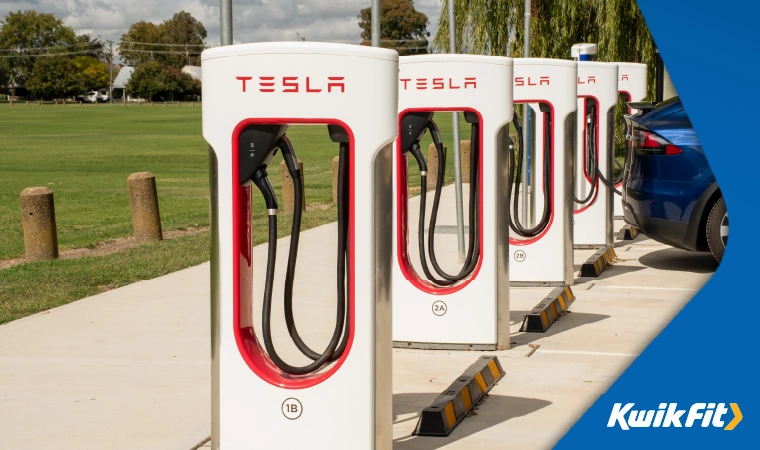How Long Does it Take to Charge an Electric Car?
Jessica Bird | Saturday 13th September 2025 11:03am

As of June 2025, there were over 1.5 million fully electric cars in the UK, up from 345,000 in 2021 - making up nearly 5% of all vehicles on the road.
Given those figures, itís clear that EV ownership rates have soared in recent years. But some motorists are still sceptical, especially when it comes to charging times and range.
If youíre considering the switch to EV but want to know how long it actually takes to charge an electric vehicle, read on.
EV charging times summary
- Charging an electric car can take as little as 15 minutes if using a 350kW ultra-rapid charger.
- If using a three-pin plug, it could take up to 24 hours to charge.
- You can calculate the charging time in hours by dividing the battery size (kWh) by the charger power (kW).
How to charge an electric car
You can either charge your electric car at home (where 80% of charging happens) or on the go at one of 82,000 public EV chargers in the UK, as of July 2025. Hereís how to charge your electric car at a public charging station:
- Locate a charging station near you by using a mobile phone app like ZapMap, or familiarising yourself with which service stations or fuel stations have them. In some electric cars, the built-in GPS has charging sites already plotted for ease.
- When youíve located a site, pull up to the designated space and plug your car into the port.
- If the station is tethered, you can use the on-site cord for charging, but if it isnít, you will need to provide your own cord.
- For payment, public charging stations are increasingly allowing contactless payment options through apps or debit and credit cards.
How long will my electric car take to charge?
Broadly speaking, electric cars can take as little as 30 minutes and as long as 12 or more hours to charge. There simply is no single answer, due to the range of factors affecting the charging speed of each vehicle.
However, according to Podpoint, a typical electric car with a 60kWh battery would take around 8 hours to charge from empty to full at a 7kW charging point.
It is worth noting, though, that most drivers rarely charge their car from empty to full, opting for the quicker Ďtop upí charging method instead - especially if they are on the go.
How to calculate electric vehicle charging time
If you know the power of the charger youíre using and your carís battery size, you can figure out how long charging will take with a simple sum:
Battery size (kWh) / charger power (kW) = charging time (h).
If you had an electric car with a battery of 60kWh, like a Tesla Model Y, and you were using an ultra-rapid 150kW charger, it would take around 20 minutes to charge the car nearly to full.
Here are the top electric cars to buy in 2025 (according to WhatCar) and their average (standard range) battery sizes, to give you more of a feel for how long charging might take. Weíve chosen 50kW as an average rapid charger power value. As of November 2024, there were over 13,000 rapid or ultra-rapid chargers across the UK.
| Model | Battery size | Charger power | Charging time |
|---|---|---|---|
| Renault 5 | 52 kWh | 50kW | 1.04 hours (=1 hr 2 min) |
| Tesla Model 3 | 57.5 kWh | 50kW | 1.15 hours (=1 hr 9 min) |
| Kia EV3 | 58.3 kWh | 50kW | 1.17 hours (=1 hr 10 min) |
| Skoda Elroq | 59 kWh | 50kW | 1.18 hours (= 1 hr 11 min) |
| Volkswagen ID. Buzz | 79 kWh | 50kW | 1.58 hours (=1 hr 35 min) |
What affects electric vehicle charging speed?
The time it takes to charge an electric car depends mostly on the battery of the car and how powerful the charger is.
Charger type
There are four speeds, or power ratings, when it comes to chargers:
- Slow (3-7kW)
- Fast (8-49kW)
- Rapid (50-149kW)
- Ultra-rapid (150kW+).
In recent years, the number of ultra-rapid chargers has boomed due to advancements in technology. Now, you can even get 350 kW chargers, though these are still uncommon.
Slow chargers
If you are charging your car at home or at an old street-side charging point that hasnít yet been updated, you can expect to use a slow charger.
Using a slow charger to fully charge an electric car with a battery of 40 kWh like the Nissan LEAF (2018) would take approximately 11 hours, while a Tesla Model S (2019) would take 21 hours.
This charging type is increasingly becoming outdated, as battery sizes get larger and fast charging stations become more accessible.
Fast chargers
Fast chargers can charge at anything from 8kW to 49kW and are the most common type of charging point in the UK. Often referred to as Ďwallboxesí, these charging stations can be installed in your home or placed street-side or at service stations. For the vehicles used in the example above, a fast charger of 22kW would take between 5-6 hours to fully charge them.
Rapid & ultra rapid chargers
Rapid and ultra-rapid chargers, on the other hand, are in a league of their own entirely. As their name suggests, these chargers are the fastest charger type, operating at 50kWh+ and cutting charging speeds down to just 2 hours or less for some vehicles.
Tesla has their own version of a rapid charger that charges at a whopping 150kWh, taking less than an hour, but thatís just for Tesla drivers to enjoy.

Vehicle type & battery capacity
Another significant factor that influences charging speed is the vehicle type. Different models of electric cars will have different battery capacities, and therefore different charging speeds.
Itís important to check what charging power your EV can handle, especially if you drive an older model.
Before choosing the electric car for you, make sure you familiarise yourself with the wide range of battery capacities on the market. Using a tool like the Electric Vehicle Database, for instance, allows you to compare the difference in kWh for electric cars.
According to the database, the Smart EQ forfour has the lowest at just 16.7 kWh, while the Mercedes EQS 450+ has the highest at 107.8 kWh, therefore taking the longest to charge - but needing to charge the least often.
Keep your EV road-worthy with Kwik Fit
However fast your electric vehicle charges, keep it on the road as long as possible with regular EV servicing from Kwik Fit. With over 300 electric vehicle servicing locations across the UK, our technicians are specifically certified to maintain EVs. Contact your local Kwik Fit today.
Any facts, figures and prices shown in our blog articles are correct at time of publication.
Featured Articles
Is it Illegal to Drive With One Headlight?
Saturday 19th July 2025
Wondering if itís illegal to drive with one headlight? Learn about the safety risks and penalties of illegal blown bulbs and why you should fix them promptly.
Air Con in EVs & Hybrids: Experts Answer Your Questions
Monday 30th June 2025
Does air con drain EV batteries? Can you use the air con while charging an electric car? Find out the answers to these questions & more from Kwik Fitís experts.
Why Is Your Car Making a Noise? Fixes & Tips
Friday 13th June 2025
When your car starts making unexpected noises, it can certainly be quite disconcerting; it may be nothing to worry about, but hereís what you need to know.









